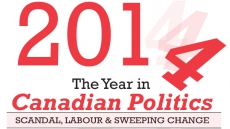WASHINGTON — Proponents of Canada's Keystone XL pipeline might be scratching their heads raw this week wondering how they got 59 per cent support in a U.S. congressional vote and still didn't get a pipeline law.
If it's any consolation, their pet legislative cause is now added to the abundant annals of bills that have bitten the dust in the U.S. Senate despite clear majority support.
The chamber's filibuster rules have made it a graveyard of legislative ambition. A gun-control bill went down despite having majority support last year, as did a climate-change plan in 2010, a public health-care option in 2009 and, going back further, multiple civil-rights measures including anti-lynching laws.
How did the U.S. Senate get this way? After all, there's nothing in the American Constitution that mentions the need to obtain a 60-vote supermajority to get something passed.
For the short answer, it might be worth skipping over the first 141 years of U.S. history, flying past the debates over the country's founding philosophy, and landing right in the middle of the First World War.
At that precise moment, Canada and the U.S. faced a very similar dilemma. They responded quite differently, with long-lasting consequences.
"(This) is the only legislative body in the world which cannot act when its majority is ready for action," U.S. president Woodrow Wilson thundered, referring to his country's Senate in 1917.
"A little group of wilful men, representing no opinion but their own, have rendered the great government of the United States helpless and contemptible."
What Wilson wanted was to arm American merchant ships. What Canada's prime minister, Robert Borden, wanted was to supply the British Navy a few years earlier, with war approaching.
Wilson's plans were tied up for weeks by an end-of-session filibuster, designed to run out the congressional clock. Borden's plans were filibustered by Wilfrid Laurier's Liberals, who proposed a cheaper made-in-Canada alternative and hoped to run out the clock until an election.
Wilson demanded a new cloture rule to end filibusters. His congressional allies gave him one a few days later — though they set the requirement for cloture at a two-thirds majority, or 67 votes in today's Senate.
Borden also invoked closure for the first time in his country's history. But he did it with a simple majority, following the example set by the British parliament a few decades earlier in limiting lengthy filibusters by Irish nationalists.
A political scientist at the University of Montreal, Jean-Francois Godbout, tells those two stories to illustrate each country's evolution toward the systems we know today.
So which one's better?
"It depends if you like the status quo," said Godbout, who specializes in comparative legislative politics. "There are positives and negatives in both systems."
He uses the example of modern-day Liberals and Conservatives. In the last decade, he says, they've probably taken turns longing for a U.S.-style brake pad on the legislative process when they're in opposition, then pressing the gas pedal when they're in government.
Statistics demonstrate the faster speed of Canada's legislative machine:
—In Canada, 77 per cent of government bills introduced in the last parliamentary session became law — 50 out of 65 — and even four per cent of private members' bills were adopted.
—In the U.S., two per cent of bills have become law in this historically unproductive Congress. And even in a prolific legislative era, like the 1987-88 session, only seven per cent made it through.
Some prominent analysts argue that U.S. changes had unintended consequences over time — that modern-day gridlock is a bug, not a feature of the American political system.
After the 1917 affair, cloture was rarely used. Senators put up increasingly lengthy filibusters, the most famous being Strom Thurmond who railed against the 1957 Civil Rights Act for a record 24 hours, 18 minutes.
Congressional brass would generally let these members tire themselves out, then pass their laws. But they began using cloture more often during the civil-rights era, and found that the 67-vote barrier was impossibly high.
So they struck a deal in 1975: the bar was lowered to 60 votes, in exchange for adopting what amounts to filibuster-by-default. In other words, most types of bills are considered automatically filibustered without 60 votes.
Chamber-clogging theatrics like Thurmond's are now largely extinct. Members can now kill bills in absentia — and these phantom-filibusterers do it all the time.
It's caused considerable frustration but the rule has remained mostly intact. The biggest change came last year, as Democrats used the so-called nuclear option to let a simple majority approve various government appointments. That's what triggered a furious standoff that held up many ambassadorial nominations, including Bruce Heyman's to Canada.
Things can move much more quickly in state legislatures.
Unencumbered by such rules, they've been exceptionally active by comparison. On the left side of the political spectrum, Vermont is enacting single-payer health care and California now has a budget surplus after raising taxes. On the right, different states are adopting right-to-work laws.
The Senate, meanwhile, can frustrate both sides. Consider the cap-and-trade bill, where it crushed environmentalists' hopes, and then made some of those same groups happy by stalling Keystone.
That seemingly incongruous behaviour has one common thread: inertia.
"In a nutshell, it tells you everything you need to know about the filibuster," said Rafael Jacob, a Canadian-born political-science instructor at Philadelphia's Temple University.
"It tells you that it's not a defender of the left or right — it's a defender of the status quo."
There's another common thread there. In both cases, the majority lost.
The Senate not only ignored the plurality of voices in the chamber, but also broader public opinion, according to numerous polls that have shown American support for Keystone and for a cap-and-trade plan.
There's another historical anecdote — this one going all the way back to the founding fathers. Jacob shares it to suggest that the Senate's job has always been to stifle the passions of public opinion.
Upon returning from his posting in France, Thomas Jefferson is said to have asked George Washington over breakfast why he'd agreed to a second congressional chamber. According to the famous and possibly apocryphal tale, Washington replied by asking Jefferson why he was pouring his coffee into a saucer before drinking.
Too cool it, Jefferson said. And that, Washington replied, is the role of the Senate: "We pour our legislation into the Senatorial saucer to cool it."





